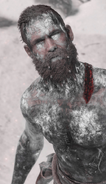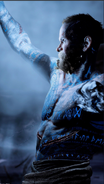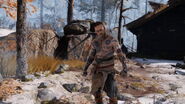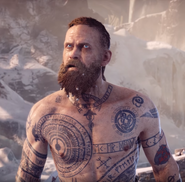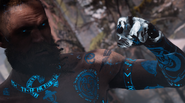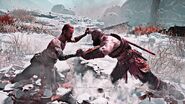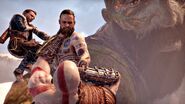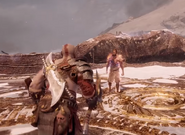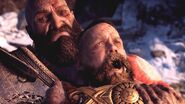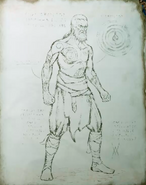No edit summary Tag: Visual edit |
(clean up, typos fixed: viking → Viking) |
||
| Line 34: | Line 34: | ||
== Norse Mythology == |
== Norse Mythology == |
||
| − | + | Baldur was one of the most beloved of all the gods. The son of [[Odin]], the chief of the [[Aesir|gods]], and the benevolent sorceress goddess [[Frigg]], Baldur was a generous, joyful, and courageous character who gladdened the hearts of all who spent time with him. When, therefore, he began to have ominous dreams of some grave misfortune befalling him, the fearful gods appointed Odin to discover their meaning. |
|
Baldur’s father wasted no time in mounting his steed, [[Sleipnir]], and riding to [[Helheim|the underworld]] to consult a dead seeress whom he knew to be especially wise in such matters. When, in one of his countless disguises, he reached the cold and misty underworld, he found the halls arrayed in splendor, as if some magnificent feast were about to occur. Odin woke the seeress and questioned her concerning this festivity, and she responded that the guest of honor was to be none other than Baldur. She merrily recounted how the god would meet his doom, stopping only when she realized, from the desperate nature of Odin’s entreaties, who this disguised wanderer truly was. |
Baldur’s father wasted no time in mounting his steed, [[Sleipnir]], and riding to [[Helheim|the underworld]] to consult a dead seeress whom he knew to be especially wise in such matters. When, in one of his countless disguises, he reached the cold and misty underworld, he found the halls arrayed in splendor, as if some magnificent feast were about to occur. Odin woke the seeress and questioned her concerning this festivity, and she responded that the guest of honor was to be none other than Baldur. She merrily recounted how the god would meet his doom, stopping only when she realized, from the desperate nature of Odin’s entreaties, who this disguised wanderer truly was. |
||
| Line 46: | Line 46: | ||
The wily and disloyal [[Atreus|Loki]] sensed an opportunity for mischief. |
The wily and disloyal [[Atreus|Loki]] sensed an opportunity for mischief. |
||
| − | In disguise, he went to Frigg and asked her, “Did |
+ | In disguise, he went to Frigg and asked her, “Did ''all'' things swear oaths to spare Baldur from harm?” “Oh, yes,” the goddess replied, “everything except the mistletoe. But the mistletoe is so small and innocent a thing that I felt it superfluous to ask it for an oath. What harm could it do to my son?” Immediately upon hearing this, Loki departed, located the mistletoe, and brought it to where the gods were playing their new favorite game. |
| − | He approached the blind god [[Hodr]] (Old Norse |
+ | He approached the blind god [[Hodr]] (Old Norse ''Höðr'', “Slayer”) and said, “You must feel quite left out, having to sit back here away from the merriment, not being given a chance to show Baldur the honor of proving his invincibility.” The blind god concurred. “Here,” said Loki, handing him the shaft of mistletoe. “I will point your hand in the direction where Baldur stands, and you throw this branch at him.” So Hod threw the mistletoe. It pierced the god straight through, and he fell down dead on the spot. |
The gods found themselves unable to speak as they trembled with anguish and fear. They knew that this event was the first presage of [[Ragnarok]], the downfall and death, not just of themselves, but of the very cosmos they maintained. |
The gods found themselves unable to speak as they trembled with anguish and fear. They knew that this event was the first presage of [[Ragnarok]], the downfall and death, not just of themselves, but of the very cosmos they maintained. |
||
| Line 58: | Line 58: | ||
All kinds of beings from throughout the Nine Worlds attended this ceremony: [[Aesir|go]][[Vanir|ds]], [[Jotnar|giants]], [[elves]], [[dwarves]], [[valkyries]], and others. Together they stood and mourned as they watched the burning ship disappear over the ocean. |
All kinds of beings from throughout the Nine Worlds attended this ceremony: [[Aesir|go]][[Vanir|ds]], [[Jotnar|giants]], [[elves]], [[dwarves]], [[valkyries]], and others. Together they stood and mourned as they watched the burning ship disappear over the ocean. |
||
| − | Meanwhile, Hermod rode nine nights through ever darker and deeper valleys on his quest to rescue the part of Baldur that had been sent to Hel. When he came to the river Gjoll ( |
+ | Meanwhile, Hermod rode nine nights through ever darker and deeper valleys on his quest to rescue the part of Baldur that had been sent to Hel. When he came to the river Gjoll (''Gjöll'', “Roaring”), [[Móðguðr]], the giantess who guards the bridge, asked him his name and his purpose, adding that it was strange that his footfalls were as thundering as those of an entire army, especially since his face still had the color of the living. He answered to her satisfaction, and she allowed him to cross over into Hel’s realm. Sleipnir leapt over the wall around that doleful land. |
Upon entering and dismounting, Hermod spotted Hel’s throne and Baldur, pale and downcast, sitting in the seat of honor next to her. Hermod spent the night there, and when morning came, he pleaded with Hel to release his brother, telling her of the great sorrow that all living things, and especially the gods, felt for his absence. Hel responded, “If this is so, then let every thing in the cosmos weep for him, and I will send him back to you. But if any refuse, he will remain in my presence.” |
Upon entering and dismounting, Hermod spotted Hel’s throne and Baldur, pale and downcast, sitting in the seat of honor next to her. Hermod spent the night there, and when morning came, he pleaded with Hel to release his brother, telling her of the great sorrow that all living things, and especially the gods, felt for his absence. Hel responded, “If this is so, then let every thing in the cosmos weep for him, and I will send him back to you. But if any refuse, he will remain in my presence.” |
||
| − | Hermod rode back to Asgard and told these tidings to the gods, who straightaway sent messengers throughout the worlds to bear this news to all of their inhabitants. And, indeed, everything did weep for Baldur – everything, that is, save for one giantess: [[Tokk]] ( |
+ | Hermod rode back to Asgard and told these tidings to the gods, who straightaway sent messengers throughout the worlds to bear this news to all of their inhabitants. And, indeed, everything did weep for Baldur – everything, that is, save for one giantess: [[Tokk]] (''Þökk'', “Thanks”), who was none other than Loki in another disguise. Tokk coldly told the messengers, “Let Hel hold what she has!” |
And so Baldur remained with Hel until Ragnarok, when, after the cosmos was destroyed and re-created, he returned to bless the land and its inhabitants with his gladdening light and exuberance. |
And so Baldur remained with Hel until Ragnarok, when, after the cosmos was destroyed and re-created, he returned to bless the land and its inhabitants with his gladdening light and exuberance. |
||
| Line 114: | Line 114: | ||
== Physical description == |
== Physical description == |
||
| − | Baldur was shown to be very tall and slender, though still much shorter in comparison with Kratos, with icy blue eyes and handsome (if haggard) features, with a beaded brownish beard. He wore dark pants with a brown sash leaving his top half completely exposed to the elements, along with brown |
+ | Baldur was shown to be very tall and slender, though still much shorter in comparison with Kratos, with icy blue eyes and handsome (if haggard) features, with a beaded brownish beard. He wore dark pants with a brown sash leaving his top half completely exposed to the elements, along with brown Viking boots. On his body he had several distinct tattoos of runes in ancient Norse. |
== Powers and Abilities == |
== Powers and Abilities == |
||
| Line 165: | Line 165: | ||
* Revisiting Freya's cottage post-game will have Mimir reveal that though she is capable of it, Freya is not likely to revive Baldur as being reanimated is a torturous experience. However, in Norse myth it is said Baldur's mother does indeed attempt to retrieve him from Hel, and due to failing this, Baldur is one of the few gods to return regardless following Ragnarök. |
* Revisiting Freya's cottage post-game will have Mimir reveal that though she is capable of it, Freya is not likely to revive Baldur as being reanimated is a torturous experience. However, in Norse myth it is said Baldur's mother does indeed attempt to retrieve him from Hel, and due to failing this, Baldur is one of the few gods to return regardless following Ragnarök. |
||
* When Baldur mentions that he is not like his brother, this is likely referencing Thor, since he declared, "I'm not my brother. And if you'd given me what I wanted, it wouldn't have ended this way," referencing Thor's preference of violence and brute force over diplomacy. |
* When Baldur mentions that he is not like his brother, this is likely referencing Thor, since he declared, "I'm not my brother. And if you'd given me what I wanted, it wouldn't have ended this way," referencing Thor's preference of violence and brute force over diplomacy. |
||
| − | * His theme is '' |
+ | * His theme is ''[https://www.youtube.com/watch?v=RG8YTAoRWEQ Deliverance]''. |
* Strangely, in Norse mythology, despite his violent death Baldur was stated to have ended up in [[Helheim]] instead of [[Valhalla]]. Whether or not this holds true in the game is currently unknown. |
* Strangely, in Norse mythology, despite his violent death Baldur was stated to have ended up in [[Helheim]] instead of [[Valhalla]]. Whether or not this holds true in the game is currently unknown. |
||
** This not only contradicts the very real world beliefs that the Vikings had that all warriors go to Valhalla, but also [[Mimir|Mimir's]] own who states that the [[Aesir]] have their own ways of getting to Valhalla. |
** This not only contradicts the very real world beliefs that the Vikings had that all warriors go to Valhalla, but also [[Mimir|Mimir's]] own who states that the [[Aesir]] have their own ways of getting to Valhalla. |
||
Revision as of 15:21, 21 June 2018
| “ | And here I thought your kind was supposed to be so enlightened. So much better than us. So much smarter. And yet you hide out here in the woods; like a coward. | ” |
–-Baldur to Kratos | ||
Template:Infobox gods
Baldur (also known as The Stranger) was the grandson of Odin and Freya, half-brother of Thor and Týr, and the uncle of Magni and Modi.
He served as the main antagonist in God of War (2018).
Norse Mythology
Baldur was one of the most beloved of all the gods. The son of Odin, the chief of the gods, and the benevolent sorceress goddess Frigg, Baldur was a generous, joyful, and courageous character who gladdened the hearts of all who spent time with him. When, therefore, he began to have ominous dreams of some grave misfortune befalling him, the fearful gods appointed Odin to discover their meaning.
Baldur’s father wasted no time in mounting his steed, Sleipnir, and riding to the underworld to consult a dead seeress whom he knew to be especially wise in such matters. When, in one of his countless disguises, he reached the cold and misty underworld, he found the halls arrayed in splendor, as if some magnificent feast were about to occur. Odin woke the seeress and questioned her concerning this festivity, and she responded that the guest of honor was to be none other than Baldur. She merrily recounted how the god would meet his doom, stopping only when she realized, from the desperate nature of Odin’s entreaties, who this disguised wanderer truly was.
And, indeed, all that she prophesied would come to pass.
Odin returned in sorrow to Asgard, the gods’ celestial stronghold, and told his comrades what he had been told. Frigg, yearning for any chance of saving her treasured son, however remote, went to every thing in the cosmos and obtained oaths to not harm Baldur.
After these oaths were secured, the gods made a sport out of the situation. They threw sticks, rocks, and anything else on hand at Baldur, and everyone laughed as these things bounced off and left the shining god unharmed.
The wily and disloyal Loki sensed an opportunity for mischief.
In disguise, he went to Frigg and asked her, “Did all things swear oaths to spare Baldur from harm?” “Oh, yes,” the goddess replied, “everything except the mistletoe. But the mistletoe is so small and innocent a thing that I felt it superfluous to ask it for an oath. What harm could it do to my son?” Immediately upon hearing this, Loki departed, located the mistletoe, and brought it to where the gods were playing their new favorite game.
He approached the blind god Hodr (Old Norse Höðr, “Slayer”) and said, “You must feel quite left out, having to sit back here away from the merriment, not being given a chance to show Baldur the honor of proving his invincibility.” The blind god concurred. “Here,” said Loki, handing him the shaft of mistletoe. “I will point your hand in the direction where Baldur stands, and you throw this branch at him.” So Hod threw the mistletoe. It pierced the god straight through, and he fell down dead on the spot.
The gods found themselves unable to speak as they trembled with anguish and fear. They knew that this event was the first presage of Ragnarok, the downfall and death, not just of themselves, but of the very cosmos they maintained.
At last, Frigg composed herself enough to ask if there were any among them who were brave and compassionate enough to journey to the land of the dead and offer Hel, the death-goddess, a ransom for Baldur’s release. Hermod, an obscure son of Odin, offered to undertake this mission. Odin instructed Sleipnir to bear Hermod to the underworld, and off he went.
The gods arranged a lavish funeral for their fallen friend. They turned Baldur’s ship, Hringhorni, into a pyre fitting for a great king. When the time came to launch the ship out to sea, however, the gods found the ship stuck in the sand and themselves unable to force it to budge. After many failed attempts they summoned the brawniest being in the cosmos, a certain giantess named Hyrrokkin (“Withered by Fire”). Hyrrokkin arrived in Asgard riding a wolf and using poisonous snakes for reins. She dismounted, walked to the prow of the ship, and gave it such a mighty push that the land quaked as Hringhorni was freed from the strand. As Baldur’s body was carried onto the ship, his wife, Nanna, was overcome with such great grief that she died there on the spot, and was placed on the pyre alongside her husband. The fire was kindled, and Thor hallowed the flames by holding his hammer over them. Odin laid upon the pyre his ring Draupnir, and Baldur’s horse was led into the flames.
All kinds of beings from throughout the Nine Worlds attended this ceremony: gods, giants, elves, dwarves, valkyries, and others. Together they stood and mourned as they watched the burning ship disappear over the ocean.
Meanwhile, Hermod rode nine nights through ever darker and deeper valleys on his quest to rescue the part of Baldur that had been sent to Hel. When he came to the river Gjoll (Gjöll, “Roaring”), Móðguðr, the giantess who guards the bridge, asked him his name and his purpose, adding that it was strange that his footfalls were as thundering as those of an entire army, especially since his face still had the color of the living. He answered to her satisfaction, and she allowed him to cross over into Hel’s realm. Sleipnir leapt over the wall around that doleful land.
Upon entering and dismounting, Hermod spotted Hel’s throne and Baldur, pale and downcast, sitting in the seat of honor next to her. Hermod spent the night there, and when morning came, he pleaded with Hel to release his brother, telling her of the great sorrow that all living things, and especially the gods, felt for his absence. Hel responded, “If this is so, then let every thing in the cosmos weep for him, and I will send him back to you. But if any refuse, he will remain in my presence.”
Hermod rode back to Asgard and told these tidings to the gods, who straightaway sent messengers throughout the worlds to bear this news to all of their inhabitants. And, indeed, everything did weep for Baldur – everything, that is, save for one giantess: Tokk (Þökk, “Thanks”), who was none other than Loki in another disguise. Tokk coldly told the messengers, “Let Hel hold what she has!”
And so Baldur remained with Hel until Ragnarok, when, after the cosmos was destroyed and re-created, he returned to bless the land and its inhabitants with his gladdening light and exuberance.
In the God of War Series
Early life
Baldur was an Aesir born to Odin and Freya and was the half-brother of Thor and Týr. At some point in his life, his mother learned from the runes that he would die a "needless death". Determined to prevent his death at any cost, Freya placed a spell on him that made him invulnerable to all threats, physical or magical. However, the spell had a side-effect of removing Baldur's ability to physically feel anything. He could no longer feel anything from pain and pleasure to even the temperature of wherever he stood. Baldur’s pleas to Freya to lift the spell fell on deaf ears, and Freya insisted that Baldur would thank her for it. As a result, Baldur was driven mad, and he was consumed with hatred for his mother and vowed to never forgive her.
God of War (2018)
Baldur answers to Odin's call to hunt down the Jötunn Guardian, one of the two remaining Jötnar in Midgard who had been foiling the Aesir's plans for some time. With the sudden disappearance of the protection spell of the Wildwoods, Baldur decided to investigate, eventually finding the cabin where the Guardian lived. Mistaking the Guardian's husband, the Greek God Kratos, for the actual Guardian, Baldur confronts the God, who in turn thought Baldur knew his past as the "Ghost of Sparta". Unbeknownst to Baldur, the Guardian had died mere days before and had been cremated minutes prior to his arrival. Kratos is at first unwilling to fight, even though Baldur continuously taunts and punches him, but eventually gives in and punches Baldur to the ground. When Kratos tries to tell him to leave, Baldur punches Kratos clear over the house. The two start to brutally fight and Kratos is able to overpower Baldur, but the latter seems unaffected by the punches or slashes from his axe. Baldur then reveals he doesn't feel pain. Kratos seemingly kills Baldur by snapping his neck, causing him to tumble off a cliff.
Due to Freya's spell, he was simply incapacitated by Kratos' attack. Gathering his nephews, Magni and Modi, they visited the imprisoned ambassador of the Aesir, Mimir, hoping to gain the knowledge of Kratos and his son Atreus. However, they get nowhere, as Mimir doesn't know who the two are and is unable to locate them due to a concealing rune placed by Freya. Baldur tells him that he would give his word to Odin if he helped them, but an unimpressed Mimir tells the three to leave.
Later, when Kratos, Mimir, and Atreus prepare to go to Jötunheim, Baldur ambushes them, gaining the upper hand against Kratos and goads Atreus into attacking him. Atreus tries to fight Baldur, feeling that he is ready for the confrontation. Kratos tries to stop him, only to be shot with an arrow by Atreus. Baldur grows amused upon seeing Atreus strike at his father when he attempted to keep him out of the fight. An overconfident Atreus attacks Baldur but fails to kill him, and he knocks the boy unconscious before departing on a dragon. Kratos jumps off the mountain, intercepts them and fights Baldur, who eventually makes it to the realm travel room and puts in Asgard as the destination, hoping to bring the full weight of the Aesir down upon Kratos. After another brutal fist fight, Kratos alters the destination to Helheim, sending them flying into the Realm of the Dead. Baldur comes across an illusion taking the form of his memories, specifically the time he confronted his mother, Freya, over her spell she placed on him. Since the spell made him invulnerable, he could no longer physically feel anything, pain or pleasure. Baldur angrily lashes out at his mother, despite her reasons and motives. Kratos and Atreus, in hiding, witness Baldur act irrationally towards the illusion and learn of his connection to Freya.
After finding a way to escape Helheim, Baldur learns of Kratos's journey into The World Serpent's stomach and wounds the giant serpent to expel the two. Emerging from the icy waters of the lake, Baldur meets his mother for the first time in decades. Despite his time away, Baldur remains resentful towards her over the spell that made him invulnerable but while Freya remains remorseful, Baldur is consumed by his hatred of her. He tries to attack her but Kratos gets in his way, leading to another fight between them. Freya tries to intervene by entangling the two with roots, believing that she can reason with him, but her spells are ineffective as the two break free.
During a small lull in the fight, Baldur overpowers Kratos and Baldur tries to punch him, but Atreus gets in the way. Kratos is horrified, believing that Atreus is wounded, but he tells him that it isn't his blood; in fact, it's Baldur's blood. It is shown that Baldur punched the mistletoe arrow that Kratos had strung onto Atreus' bow after the string was temporarily broken during the journey. Baldur then revels at his newfound pain as a horrified Freya watches on.
Being vulnerable once again, Kratos and Atreus resume their battle with Baldur again, who revels in the pain he feels. He thanks the two for their assistance, claiming that not even Odin himself was able to remove his "curse". Freya tries to intervene again, reviving the Frost Giant Thamur to do so. Her efforts end in failure as Atreus calls the World Serpent to kill the reanimated Giant. Back where they started, Kratos beats Baldur into submission but spares his life at Atreus' request.
Baldur confronts his mother once more. Freya implores her son to find understanding in her actions in an attempt to make peace with him. Baldur refuses to forgive her and nearly strangles her to death, but Kratos intervenes again. Quoting his father, Kratos claims that the cycle ends here and snaps Baldur's neck a second time, well and truly killing him. His final words are: "Snow..."
Aftermath
Freya is left devastated and enraged upon his death, despite Baldur's attempt on her life. She swears revenge upon Kratos but takes her son's body with her and disappears.
Despite her tragic fury, Mimir believes that given time, Freya will come to accept that Baldur's death was for the best and that the Nine Realms were better with her alive. However, after finally reaching the Realm of the Giants and releasing Faye's ashes, thus completing their journey, Baldur's death triggers an occurrence over the realms. Mimir believes that Fimbulwinter, the terrible winter that lasts three years, is about to happen. To make matters worse, the winter preludes the coming of Ragnarök, something that was believed not to happen for at least a hundred more years. Baldur's death, and perhaps the intervention of an outsider like Kratos, accelerated the end of the Nordic Gods.
When their journey ends, Atreus has a prophetic dream of many years later: He and his father are confronted outside of their home by a cloaked man with a mystic hammer; it's Baldur's brother, Thor, likely coming to avenge his brother and fallen sons.
Personality
- "Before you die, I want to thank you. Both of you. You've done what even the Allfather himself could not. I've never felt more alive! Ironic, isn't it?"
- ―Baldur[src]
Unlike the benevolent depiction of him in the myth, Baldur is extremely cruel, ruthless and sadistic as he seemed to take pleasure in hurting Kratos and Atreus. Since he can't feel pain, he laughs maniacally when his opponents try to harm him. According to Modi, Baldur hasn't "seen straight in years". Baldur's personality before his confrontations with Kratos are unknown, but he was likely much kinder and emotionally stable, as in his vision of the past, he was unable to kill his mother.
It's likely that Baldur's original personality prior to being cursed could've been exactly like his traditional depiction, but centuries of being unable to feel anything had gradually twisted him into the insane warrior that he now is.
Much of Baldur's ruthlessness stems from his mother, Freya, who had placed a spell on him which took away his ability to physically feel anything. Baldur laments that he can no longer taste food or drinks or experience bodily pleasures, and even the temperature of wherever he stood, and angrily admitted that he would rather die than never feel again. To his utter dismay, Freya refused to undo the spell, leaving Baldur to suffer for over a century while he vowed to make her pay for what she did to him.
A vision in Helheim reveals Baldur's regret of not killing Freya years ago. He sobs, blaming himself for being a coward and for running away, instead.
Underneath his sadistic behaviour, Baldur is an extremely miserable Aesir god. However, he does retain some sense of honour, as he was supposedly willing to leave Kratos alone without a fight had the Spartan given him the information he wanted. He also implies that unlike his brother, he is willing to show mercy. Despite this, Baldur did not have any reservations about taking hostages, using surprise attacks and threatening innocents during his battles with Kratos.
Baldur is rather talkative in a belligerent manner during a fight, as he taunts, mocks and rages at Kratos throughout all their battles. The Spartan himself said in their first encounter that he talked too much.
Baldur's rage and maniac behaviour did not vanish along with the spell and Baldur chose to continue fighting Kratos despite being relentlessly assaulted with punches and arrows from Atreus. He actually enjoyed experiencing pain to his fullest and hated every time his mother tried to protect him. Free of the spell and given a warning by Kratos, Baldur still wanted to punish his mother and chose to strangle her even as she professed her love for him.
As seen during his fight with Kratos and Atreus after his curse was broken, Baldur was shown to be somewhat of a masochist, taking great pleasure in pain as well as putting other people through the same pain.
Baldur's final moments were not of anger or rage, but the joy that he could feel the falling snow on his face.
Physical description
Baldur was shown to be very tall and slender, though still much shorter in comparison with Kratos, with icy blue eyes and handsome (if haggard) features, with a beaded brownish beard. He wore dark pants with a brown sash leaving his top half completely exposed to the elements, along with brown Viking boots. On his body he had several distinct tattoos of runes in ancient Norse.
Powers and Abilities
As a son of Odin, Baldur was an extremely powerful Norse God, certainly among the most powerful. Two of the only known Gods to surpass him are Odin and Thor. As a testament to Baldur's power, he was able to challenge and even overpower Kratos, although Kratos eventually defeated him.
Superhuman Strength: As a son of Odin, Baldur's strength is at immense superhuman levels, far surpassing that of any mortal or monster. He has enough physical aptitude to harm Jörmungandr, easily throw and smash a giant boulder and, despite his skinny and shorter body, is able to challenge Kratos: In their first battle, when Baldur and Kratos have a test of raw strength, the ground begins to collapse, leaving a progressively larger and deeper fissure beneath them.
Superhuman Speed and Agility: Baldur, perhaps due to his power over light, can move at extremely high speeds; much faster than Kratos. He uses this to effect in combat, darting around enemies before striking them.
Durability: As a god, Baldur was remarkably durable, even without his invulnerability. He was able to take extreme punishment, though his natural durability was not enough to stop Kratos from killing him or dealing what would normally be death blows over their many battles.
Light Manipulation: As the God of Light, Baldur was capable of using light in combat. The runes on his body, as well as his eyes, will light up when he uses his power. He could use light to move at extreme speeds, to send a shock wave through the ground, cause an explosion of energy, throw balls of deadly, shining energy; or power his punches even more.
Invulnerability: Baldur's greatest and most infamous attribute was his invulnerability to anything, even Kratos' Blades of Chaos. While he can be harmed, no injury can be inflicted, nor will his injuries last, as his body will naturally heal at an extremely fast rate. He also cannot physically feel any injuries, nor anything at all, enabling him to continue to fight without being slowed by his wounds. For instance, he was able to easily attack the World Serpent, a creature that gave his brother Thor a challenge, and walk out of the cold depths of the lake he resided within with no noticeable injuries.
However, his invulnerability caused him to be unable to physically feel anything, driving him insane. Also, despite his invulnerability, Baldur can be dazed and incapacitated for brief periods, such as when his neck was snapped when he first faced Kratos. His only weakness was mistletoe, the one plant his mother did not foresee harming him. Upon striking Atreus and stabbing his hand with a mistletoe arrow, the spell was broken and Baldur could not only physically feel things again, but could be harmed, much to his joy.
Additional Elemental Affinities: In addition to his light elemental abilities, Baldur was able to gain access to use of both fire and ice elements. The first was ice when Kratos had struck him on the shoulder using the Leviathan Axe and the second was fire when Atreus had detonated the undead Giant's ring on top of Baldur during the final battle with him.
Master Hand-to-Hand Combatant: Most likely because of his physical abilities and invulnerability, Baldur does not use or need weapons in combat. He favours his own physical fighting capabilities above all else and is extremely skilled. He can quickly strike, utilizing punches and kicks. He also uses elbows, knees and even some grappling, including suplexing Kratos in their first fight. His skill in pure hand-to-hand combat is unmatched, being more skilled than even Kratos (a trained spartan warrior with many victories under his belt) only losing due to Kratos' superior strength and weapons and still being able to fight him almost evenly. He can couple his moves with his superior speed, strength, and control over light to decimate enemies, even Jörmungandr.
Expert Tracker: Mimir stated that Baldur was Odin's best tracker. As such, his ability and persistence in finding a given target exceeded that of the other Aesir. Baldur manages to find Kratos's home and attack him, then again find Kratos when he opens the gate to Jötunheim. Despite being stuck in Helheim, over the bridge with which there was "no way back", Baldur stills find a way out and manages to track down Kratos and his son when they in were in the World Serpent's stomach.
Runes Translation
Note: Translations are done by fans and are subject to error, as well as the developers' use of the runes.
- The red runes on his back and across his shoulders, "ᚲᚢᚱᛊᛖᛞ", are in English and translate directly into Cursed, referring to Freya's spell and his inevitable death.
- On his left pectoral, "ᛖᚲ ᛖᚱ ᛞᚨᚢᛞᛁ", which is Ek er dauði and means "I am death", possibly a reference to the fact that his death marks the beginning of Ragnarök, the death of the Gods.
- On the circle on his lower abdomen, "ᚾᛟᚱᚾᛁᚱ·ᚠᛚᛖᛏᛏᚨ·ᚢᛏᚦᛖᛏᚨ·ᛒᚢᚾᛞᛁᚾᚾ" Nornir fletta utþeta bundinn; literally, "The Norns plait (?) bound(en)".
Trivia
- His Greek equivalent (in terms of attributes) is Apollo. Some guesses at its etymology suggest a link with "Dagr", the personified day, so he can be seen as a counterpart to the primordial day goddess Hemera.
- Some Norse text describes him as the god of love and beauty which would make him equivalent to Eros, however, he didn't show any type of amokinesis abilities in the game.
- In Helheim, his past self illusion mentioned that he is unable to gain pleasure from women thanks to the invulnerability spell his mother placed on him.
- In Gesta Danorum, Baldur is depicted as a jealous, arrogant braggart and highly malevolent, possibly setting precedent for the game's characterization. However, the entire text is extremely polemic against Germanic paganism, so it might not accurately reflect the beliefs of pre-Christian Norse.
- Baldur's invulnerability was somewhat similar to the Greek curse of Achilles. However, Baldur's curse is far worse than Achilles as he is unable to feel but at the same time is more effective as his curse makes his entire body invulnerable, unlike Achilles's weakness in his heels.
- Baldur's wife, Nanna, is briefly referenced by Brok as he proclaimed surprise at Kratos' foreign weapons; though it is unknown at this time if she will fulfil this role in the series.
- In the mythology, the pair has a son, the god of justice and reconciliation, Forseti. It is currently unknown if he also fulfill such a role in the series.
- Baldur never introduced himself to Kratos and he immediately attacks him in Kratos' home as the moniker stated in the Codex: "The Stranger". When Kratos and Atreus discuss about Norse Gods while navigating across the Lake of Nine, Kratos indirectly mentions Baldur; when asking Atreus about "one who could feel no pain", he replies "that sounds like Baldur". Later, during their journey across the Mountains where they were eavesdropping on The Stranger asking Mimir to reveal Kratos' whereabouts, The Stranger was revealed to be Baldur and the name was added the Codex.
- In all of Baldur's battles with Kratos, he had a distinct advantage against the latter god. In the first two battles, he had the element of surprise while in the final battle, he had, though unwanted, the interventions of his mother.
- Baldur's final battle with Kratos ended the same way their first battle did, with Kratos snapping his neck.
- In Norse mythology, Baldur's death was the beginning of Ragnarök, the end of many gods like Odin, Thor and Loki.
- This may be hinting that future games will include not only other gods but also their deaths (similar to the original trilogy where the death of Ares symbolized the end of the Greek Gods).
- At the conclusion of the game, Kratos states that Baldur may not have initially been tracking down him, but rather the giantess Faye, whom he was carrying the ashes of throughout their journey.
- In an ironic twist of fate, Freya's attempt to prevent Baldur's needless death could be argued to be the very reason for it, as this led to Baldur's desire for revenge. Kratos only killed him to protect Freya herself.
- During their third and final battle, before Kratos snaps Baldur's neck, Kratos says "The cycle ends here", the same phrase Zeus said when killing Kratos in God of War II. The cycle refers to the Cycle of Patricide, although in this case it was "matricide".
- Baldur has a pet dragon named Dagsetr which he used to travel to Kratos‘s home in their first encounter and was seen when Baldur kidnapped Atreus.
- A notable difference between mythology and the game is that in the original mythology, Baldur was made invulnerable after he dreamt of his death. Since dreams are considered prophetic, this caused distress to him. His mother, Frigg, made every single thing, living and lifeless, swear an oath never to harm him, except for mistletoe because she believed it was too young to swear an oath. In the game, his mother casts a spell on him to make him invulnerable.
- Baldur possessed many similarities to Kratos, i.e., both are children of the Ruling god of their mythologies, both have complex family relationships, both are skilled warriors, both are extremely powerful, and both desired revenge against one of their parents.
- Many fans mistook Baldur for Loki, the god of mischief.
- Revisiting Freya's cottage post-game will have Mimir reveal that though she is capable of it, Freya is not likely to revive Baldur as being reanimated is a torturous experience. However, in Norse myth it is said Baldur's mother does indeed attempt to retrieve him from Hel, and due to failing this, Baldur is one of the few gods to return regardless following Ragnarök.
- When Baldur mentions that he is not like his brother, this is likely referencing Thor, since he declared, "I'm not my brother. And if you'd given me what I wanted, it wouldn't have ended this way," referencing Thor's preference of violence and brute force over diplomacy.
- His theme is Deliverance.
- Strangely, in Norse mythology, despite his violent death Baldur was stated to have ended up in Helheim instead of Valhalla. Whether or not this holds true in the game is currently unknown.



